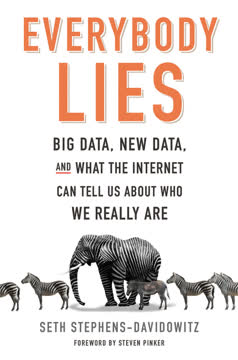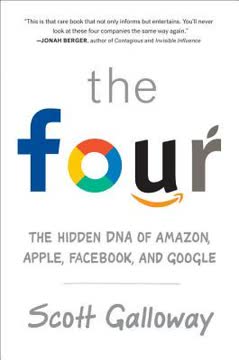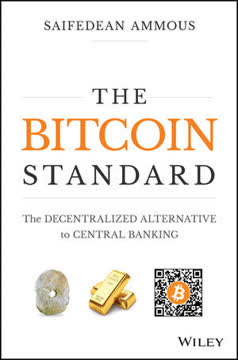Key Takeaways
1. Blockchain: The Trust Protocol for the Digital Age
"It appears that once again, the technological genie has been unleashed from its bottle. Summoned by an unknown person or persons with unclear motives, at an uncertain time in history, the genie is now at our service for another kick at the can—to transform the economic power grid and the old order of human affairs for the better."
A revolutionary technology. Blockchain technology represents a fundamental shift in how we transact and establish trust in the digital world. At its core, blockchain is a distributed ledger that allows for secure, transparent, and immutable record-keeping without the need for intermediaries.
Key features and benefits:
- Decentralization: No single point of control or failure
- Transparency: All transactions are visible to network participants
- Immutability: Once recorded, data cannot be altered
- Security: Cryptographic techniques ensure data integrity
Potential applications: Blockchain has the potential to transform various industries beyond finance, including supply chain management, healthcare, voting systems, and intellectual property rights.
2. Seven Design Principles of the Blockchain Economy
"We believe that this next era could be inspired by Satoshi Nakamoto's vision, designed around a set of implicit principles, and realized by the collaborative spirit of many passionate and equally talented leaders in the community."
Guiding principles for blockchain implementation:
- Networked Integrity: Trust is built into the system
- Distributed Power: No central authority controls the network
- Value as Incentive: Participants are rewarded for their contributions
- Security: Cryptography ensures data protection
- Privacy: Users control their personal information
- Rights Preserved: Ownership and intellectual property are protected
- Inclusion: The system is open and accessible to all
These principles form the foundation for creating a more equitable, efficient, and transparent digital economy.
3. Transforming Financial Services Through Blockchain
"Blockchain technology holds great promise to revolutionize not only payments, but also the securities industry, investment banking, accounting and audit, venture capital, insurance, enterprise risk management, retail banking, and other pillars of the industry."
Disrupting traditional finance. Blockchain technology has the potential to revolutionize the financial services industry by reducing costs, increasing speed, and improving transparency.
Key areas of impact:
- Payments and remittances: Faster, cheaper cross-border transactions
- Securities trading: Near-instantaneous settlement
- Lending: Peer-to-peer platforms and automated credit scoring
- Insurance: Smart contracts for claims processing
- Regulatory compliance: Real-time auditing and reporting
Challenges: While blockchain offers significant benefits, the industry must overcome regulatory hurdles, legacy systems integration, and scalability issues to realize its full potential.
4. Reinventing the Firm: New Business Models on the Blockchain
"We're talking about building twenty-first-century companies, some that may be massive wealth creators and powerful in their respective markets. We do think enterprises will look more like networks rather than the vertically integrated hierarchies of the industrial age."
Rethinking organizational structures. Blockchain enables new forms of decentralized organizations and business models that challenge traditional corporate structures.
Emerging models:
- Distributed Autonomous Organizations (DAOs)
- Open Networked Enterprises
- Blockchain Cooperatives
- Peer-to-Peer Platforms
These models leverage blockchain's capabilities to create more efficient, transparent, and collaborative organizations. They have the potential to democratize access to capital, reduce bureaucracy, and align incentives among stakeholders.
5. The Internet of Things Needs a Ledger of Things
"The Internet of Things needs a Ledger of Things."
Connecting the physical and digital worlds. Blockchain technology can serve as the backbone for the Internet of Things (IoT), providing a secure and scalable way to manage the vast network of connected devices.
Key benefits:
- Secure device identity and authentication
- Automated micropayments between devices
- Transparent supply chain tracking
- Decentralized data storage and sharing
Example applications:
- Smart energy grids
- Autonomous vehicle networks
- Connected healthcare devices
- Supply chain management systems
By combining IoT with blockchain, we can create more efficient, secure, and autonomous systems that bridge the gap between the physical and digital realms.
6. Blockchain as a Tool for Economic Inclusion and Prosperity
"Blockchain technology bestows individuals and small companies anywhere in the world with many of the same capabilities of larger organizations."
Democratizing access to financial services. Blockchain has the potential to bring billions of unbanked individuals into the global economy by providing access to basic financial services.
Key opportunities:
- Digital identity solutions
- Microfinance and peer-to-peer lending
- Remittances and cross-border payments
- Property rights and land registries
Impact on developing economies: By reducing barriers to entry and lowering transaction costs, blockchain can empower entrepreneurs, facilitate trade, and promote economic growth in underserved regions.
7. Rebuilding Government and Democracy on the Blockchain
"Blockchain technology is already revolutionizing the machinery of government and how we can make it high performance—better and cheaper. It's also creating new opportunities to change democracy itself."
Transforming governance and civic engagement. Blockchain has the potential to increase transparency, reduce corruption, and enhance citizen participation in democratic processes.
Applications in government:
- Secure and transparent voting systems
- Digital identity management
- Efficient public services delivery
- Transparent budgeting and spending tracking
Challenges: Implementing blockchain in government requires overcoming regulatory hurdles, ensuring privacy protection, and addressing the digital divide to ensure equal access for all citizens.
8. Unleashing Creativity: Culture on the Blockchain
"Blockchain technology provides a new platform for creators of intellectual property to get fair value for it."
Empowering artists and creators. Blockchain offers new ways for artists, musicians, and other content creators to protect their intellectual property and receive fair compensation for their work.
Key innovations:
- Smart contracts for royalty distribution
- Decentralized content distribution platforms
- Tokenization of creative works
- Transparent usage tracking and licensing
Impact on creative industries: By reducing intermediaries and providing greater transparency, blockchain can help create a more equitable and sustainable ecosystem for creators and consumers of cultural content.
9. Overcoming Implementation Challenges for Blockchain Technology
"As well, after reading this section you may be tempted to dismiss these blockchain innovators because they face serious obstacles. We encourage you to consider whether these are either "reasons the blockchain is a bad idea" or "implementation challenges to overcome.""
Addressing key hurdles. While blockchain technology holds immense promise, several challenges must be overcome for widespread adoption.
Major challenges:
- Scalability and performance
- Energy consumption (for proof-of-work systems)
- Regulatory uncertainty
- Interoperability between different blockchain networks
- User experience and adoption
Potential solutions: Ongoing research and development efforts are addressing these challenges through innovations such as layer-2 scaling solutions, alternative consensus mechanisms, and improved user interfaces. Collaboration between industry, academia, and regulators is crucial for overcoming these obstacles and realizing the full potential of blockchain technology.
Last updated:
FAQ
What's Blockchain Revolution about?
- Explores blockchain technology: Blockchain Revolution by Don Tapscott examines how blockchain, the technology behind Bitcoin, is transforming money, business, and society.
- Focus on decentralization: The book emphasizes the shift from centralized systems to decentralized networks, enabling peer-to-peer interactions without intermediaries.
- Impact on society: It discusses the potential of blockchain to create a more equitable economy, enhance transparency, and empower individuals globally.
Why should I read Blockchain Revolution?
- Comprehensive insights: The book provides a thorough examination of blockchain technology, making it accessible to both novices and experts.
- Real-world applications: It presents numerous case studies and examples of how blockchain is being implemented in various sectors, making it relevant for professionals and entrepreneurs.
- Vision for the future: The authors offer a vision of how blockchain can lead to a more inclusive and prosperous society, encouraging readers to think about the future of technology and governance.
What are the key takeaways of Blockchain Revolution?
- Trust Protocol: Introduces the concept of the "Trust Protocol," allowing secure transactions without intermediaries, foundational to blockchain's ability to create trust.
- Decentralization is crucial: Highlights the importance of decentralization in creating more resilient and transparent systems.
- Promise and Peril: Discusses both the potential benefits and challenges of implementing blockchain technology, emphasizing the need for leadership and governance.
How does blockchain technology work according to Blockchain Revolution?
- Distributed ledger: Blockchain operates as a decentralized digital ledger that records transactions across multiple computers, ensuring all participants have access to the same information.
- Cryptographic security: Each transaction is secured using cryptographic techniques, making it nearly impossible to alter or tamper with the data once recorded.
- Consensus mechanism: Relies on consensus algorithms, such as proof of work, to validate transactions, ensuring all participants agree on the state of the ledger.
What are the seven design principles of the blockchain economy in Blockchain Revolution?
- Networked Integrity: Trust is built into the system, allowing participants to transact directly without relying on intermediaries.
- Distributed Power: Power is decentralized, preventing any single entity from controlling the system, fostering inclusivity.
- Value as Incentive: Aligns the incentives of all stakeholders, ensuring participants are rewarded for their contributions.
How does Blockchain Revolution define smart contracts?
- Self-executing agreements: Smart contracts are digital contracts that automatically execute and enforce the terms of an agreement when predefined conditions are met.
- Reducing transaction costs: They eliminate the need for intermediaries, thereby reducing costs and increasing efficiency in transactions.
- Applications across industries: The book discusses various applications of smart contracts, from financial services to supply chain management.
What are DApps, as described in Blockchain Revolution?
- Decentralized applications: DApps are applications that run on a blockchain network, allowing for peer-to-peer interactions without a central authority.
- Enhanced security and transparency: They leverage the security and transparency of blockchain technology, making them less vulnerable to fraud and manipulation.
- Examples and potential: The authors provide examples of DApps in various sectors, illustrating their potential to disrupt traditional business models.
How does Blockchain Revolution address economic inclusion?
- Access to financial services: Blockchain can provide financial services to the unbanked and underbanked populations, allowing them to participate in the global economy.
- Lower barriers to entry: By reducing transaction costs and eliminating the need for intermediaries, blockchain enables more people to engage in economic activities.
- Empowerment through ownership: Blockchain allows individuals to own and control their data, giving them more agency in financial transactions.
What role does identity play in the blockchain ecosystem according to Blockchain Revolution?
- Digital identity as an asset: The book posits that digital identity will become a crucial asset in the blockchain ecosystem, enabling individuals to control their data and reputation.
- Facilitating transactions: A verified digital identity allows for secure and efficient transactions, reducing the need for traditional identification methods.
- Empowerment and trust: By establishing a reliable digital identity, individuals can engage in economic activities with greater trust and security.
What are the challenges to implementing blockchain technology as discussed in Blockchain Revolution?
- Technical barriers: There are significant technical challenges to implementing blockchain, including scalability and interoperability issues.
- Regulatory hurdles: The need for regulatory frameworks that can accommodate blockchain technology while ensuring consumer protection and security.
- Cultural resistance: Resistance from established institutions and stakeholders who may feel threatened by the disruptive potential of blockchain.
How does Blockchain Revolution envision the future of governance?
- Decentralized governance models: Blockchain can facilitate new forms of governance that are more transparent, accountable, and participatory.
- Empowering citizens: By leveraging blockchain technology, citizens can have greater control over their data and influence over decision-making processes.
- Improving public services: Blockchain can enhance the efficiency and effectiveness of public services, ultimately leading to better outcomes for society.
What are the potential risks associated with blockchain technology as discussed in Blockchain Revolution?
- Criminal use: Blockchain technology can be exploited for illegal activities, such as money laundering and fraud.
- Privacy concerns: The transparency of transactions could lead to privacy issues for individuals, requiring a balance between transparency and privacy.
- Centralization risks: Powerful incumbents may attempt to co-opt blockchain technology for their own interests, undermining its decentralized nature.
Review Summary
Blockchain Revolution receives mixed reviews. Some praise it as an insightful introduction to blockchain technology and its potential applications, while others criticize it for being overly optimistic and lacking technical depth. Positive reviewers appreciate the book's exploration of blockchain's possibilities in various industries, while critics argue it oversimplifies complex issues and fails to address potential drawbacks. Many readers found the writing style repetitive and the arguments unconvincing. Overall, the book seems best suited for those seeking a high-level overview of blockchain's potential impact rather than a technical understanding of the technology.
Similar Books










Download PDF
Download EPUB
.epub digital book format is ideal for reading ebooks on phones, tablets, and e-readers.





